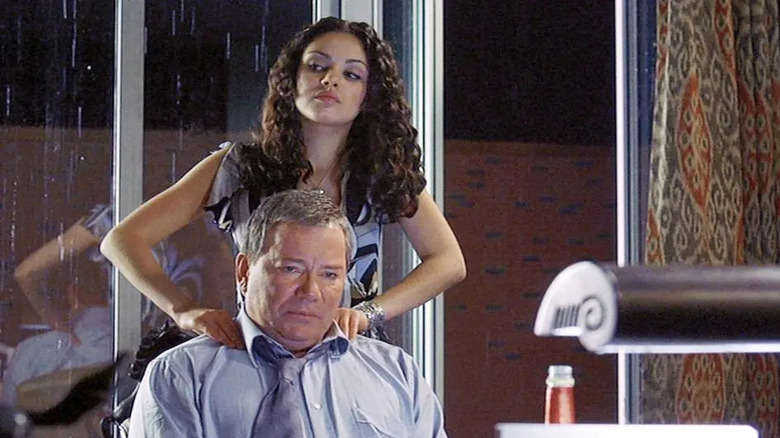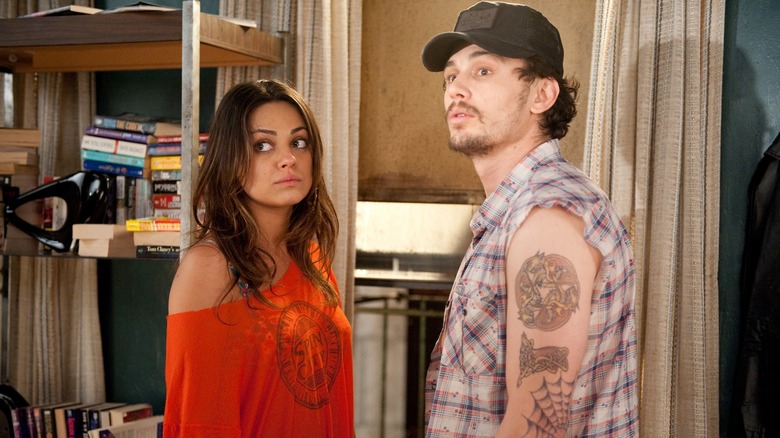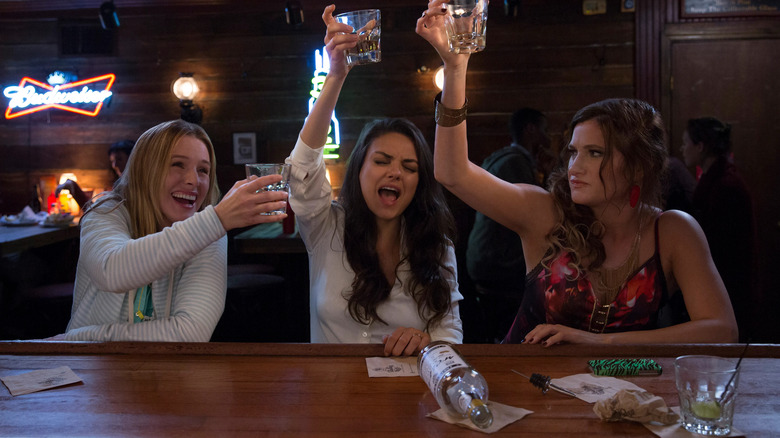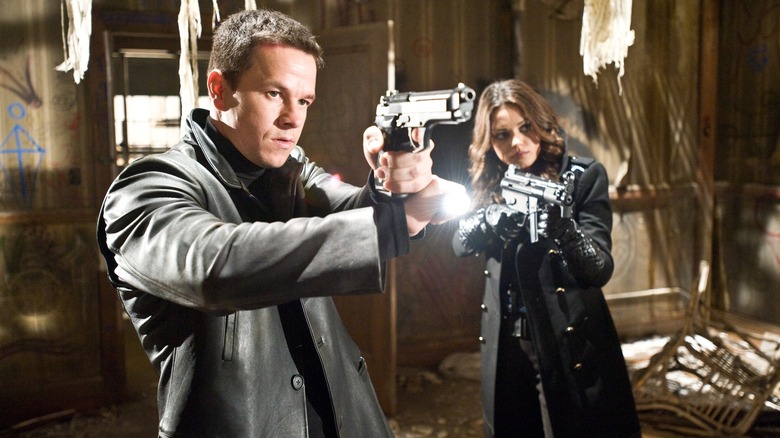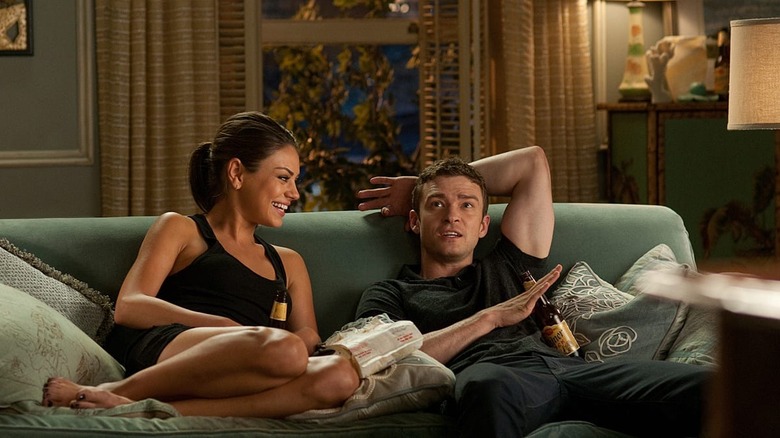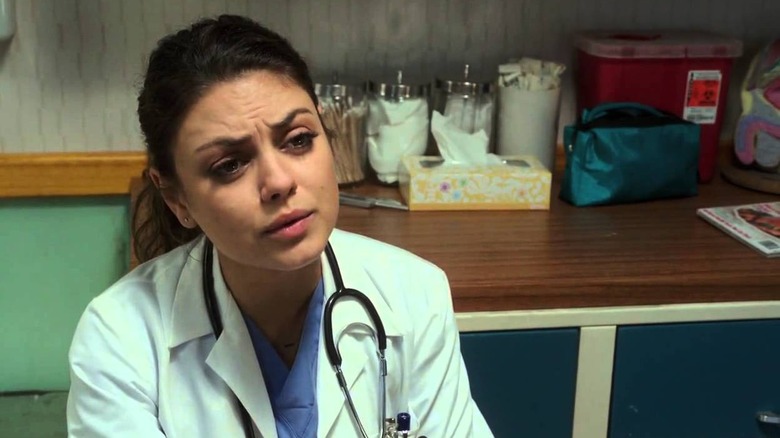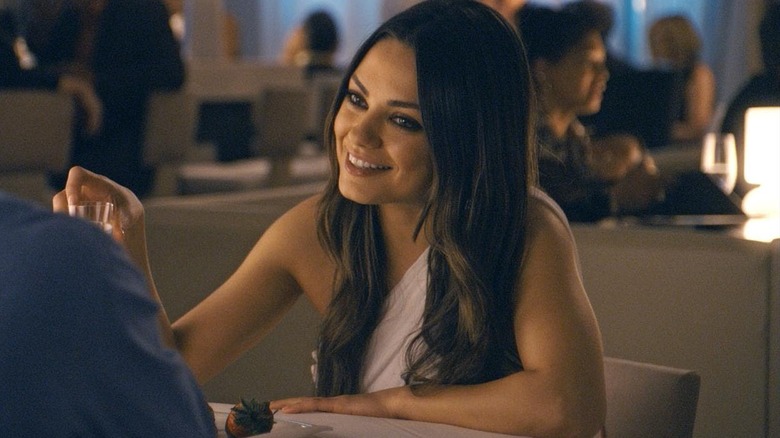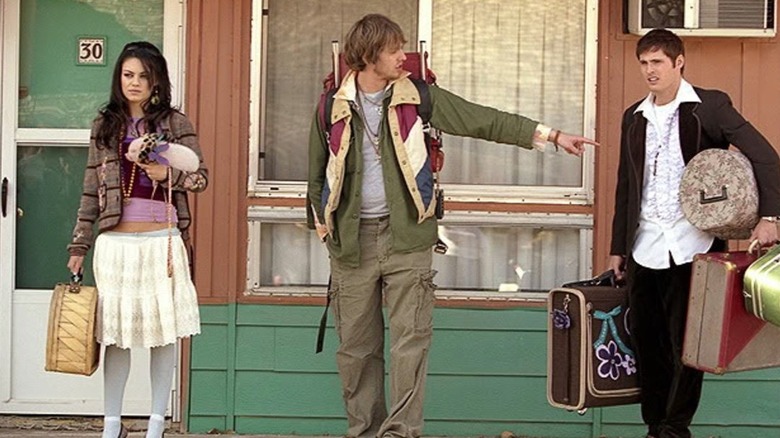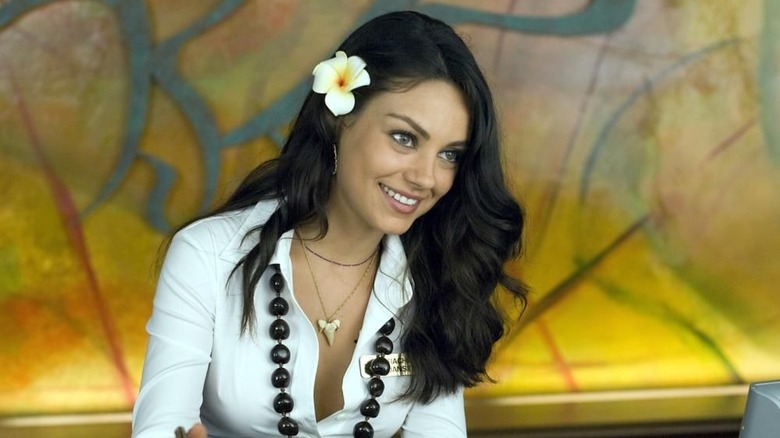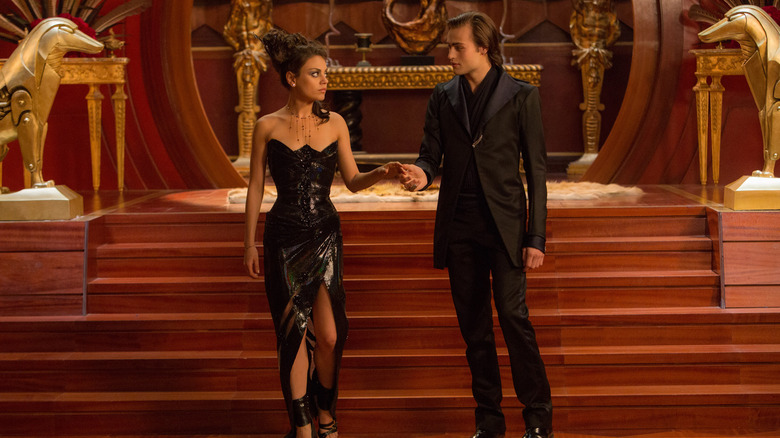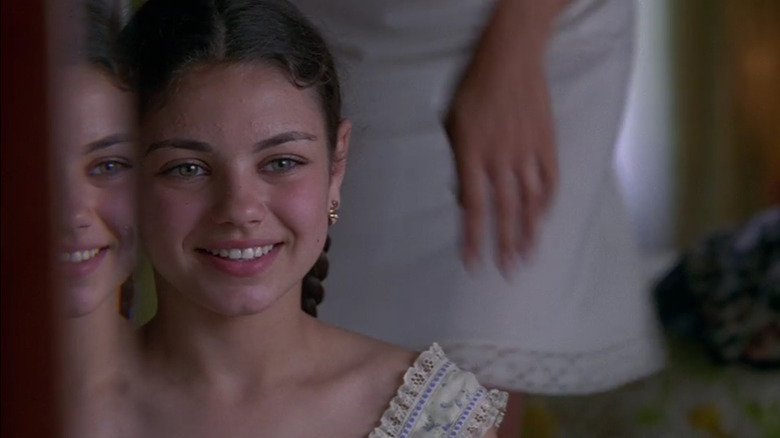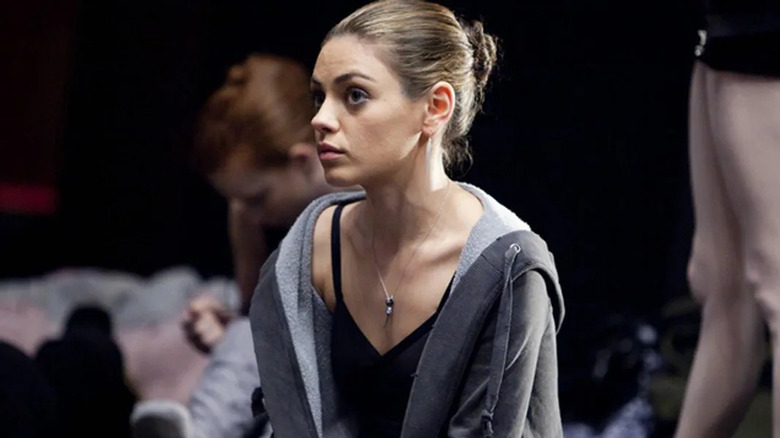Mila Kunis' 7 Best And 7 Worst Movies Ranked
The career of Mila Kunis hasn't always been terribly consistent when compared to her peers. While she initially found fame via starring roles in "That '70s Show," and has broken through at times with films like "Black Swan," her filmography is littered with other efforts that reside in the basement of Rotten Tomatoes' rating system, and she's been prone to long stretches of underperforming efforts. With help from nearly 400 episodes of "The Family Guy," however, she's remained a steady pop culture presence.
On one hand, Kunis has shown power as a supporting and lead actor; on the other, she has been know to participate in projects forgotten quickly after release. It is this dichotomy that makes Kunis a particularly interesting subject for a "Best/Worst" list. Through it all, she has appeared on talk shows and in interviews to be very down-to-earth, keeping her among the ranks of Hollywood's most-likable actors.
As an example, Kunis appeared on a 2021 episode of Hot Ones and worked considerable charm while downing some spicy wings and reminding audiences why they fell in love with her when she first graced screens as Jackie in "That '70s Show," more than 20 years ago. Whether the projects are good or bad, Kunis always seems to be a welcomed (or wasted) presence. With that in mind, here's a breakdown of her best and worst.
Worst: American Psycho II: All American Girl (2002)
Not every hit movie needs a sequel. When Mary Harron's adaptation of Bret Easton Ellis' "American Psycho" graced the big screen in 2000, it became one of the most talked about movies of the year. Christian Bale's performance as psychopathic murderer Patrick Bateman became iconic, proving to be Bale's breakout role as an adult actor. When a direct-to-video, Bale-and-Harron-less sequel was greenlit two years later, movie fans became understandably suspicious; they didn't know the half of it.
Kunis agreed to star in a film called "The Girl Who Wouldn't Die," which had no more association with "American Psycho" than it did "Teletubbies." After production began, the script was altered to create a (tenuous at best) connection to the hit film. Bret Easton Ellis, and later Kunis herself were not pleased.
The film tells the tale of Rachael (Kunis), a criminology student vying for a teaching assistant gig who begins killing off the competition. Erasing everything its predecessor attempted to do — including, very literally, killing Bateman mere minutes into the film – this direct-to-video dud dispatches all of the meta commentary and feminist subtext of Harron's film for generic sexual thriller cliches. At the time of its 2022 release, Kunis was an up-and-comer thanks to "That '70s Show," but that couldn't save a horrendous script that not even the producers had enough faith in to resist the temptation of slathering an "American Psycho" coat of paint all over it.
The only bright spot in the film comes via William Shatner's performance as an arrogant professor. While "American Psycho" has remained an '00s classic, "American Psycho II" has the honor of being occasionally mentioned as an ill-intentioned curiosity alongside the likes of "Caddyshack II," "The Sting II," "Son of the Mask," and "Dumb and Dumberer."
Best: Date Night (2010)
A one-two punch like Steve Carell and Tina Fey would seem to yield comedy lightning in a bottle, and director Shawn Levy harnessed it admirably with "Date Night," a cute-if-toothless comedy that had Kunis and James Franco shining in supporting roles.
The film follows a married couple (Carell and Fey) attempting to put a spark in their marriage with an evening of romance. When the couple's night turns into an "After Hours"-like misadventure of disasters and danger, fueled by action-packed run-ins with the mob and colorful side characters, it's enough to make them wish they'd stayed home in their pajamas.
Kunis plays Whippet, the wife of Taste (Franco); the duo wield significant comedic chemistry, stealing multiple scenes. Mark Wahlberg, Taraji P. Henson, Common and Leighton Meester are among the other significant stars in a solid supporting cast. The end result was that "Date Night" became a solid box-office hit, pulling in more than $150 million worldwide and yielding generally favorable reviews from critics.
Worst: The Color of Time (2012)
Franco and Kunis were less successful in their next teaming, the barely-seen, Terrence Malick-aspiring "Color of Time," based on trippy remembrances of acclaimed poet C. K. Williams.
While "Date Night" channeled the chemistry between the two stars for laughs, "Time" gives the viewer endless scenes of them nuzzling and existing more as rose-colored concepts than fully-fleshed-out human beings. The film casts Franco as Williams, desperate to write something new but haunted by past reflections of marriage, loss, and becoming a father. Barely clocking in at over an hour, and directed by a dozen people, the film somehow manages to be about a poet's life without feeling poetic in the slightest way.
Intended as a celebration of Williams work, the end result is a somnambulant drama that ruminates on itself too much for its own good.
"It's like a music video for the poems, often literal in its biographical readings," wrote the New York Times. "Franco's performance is lackluster and lifeless, while Kunis' portrayal of Williams' wife Catherine is a fleeting misstep. That's not a result of Kunis' acting, but more so a critique of the script, which was written and directed by 12 of Franco's New York University film students — and not one of them could save it."
Best: Bad Moms (2016)
Following a streak of ambitious-but-misdirected misfires like "Jupiter Ascending" and "Third Person," Kunis returned to crowdpleasing fare with a fun performance in this raunchy comedy. Alongside Kristen Bell and Kathryn Hahn, the three made for a memorable collection that would return for a sequel the following year, "A Bad moms Christmas."
The original film follows an overworked, exhausted mom (Kunis) who wants to get away from her daily life and responsibilities. After catching her husband cheating, she meets up with two other moms at a local bar, and the three share an all-night bender that makes the put-upon housewife reevaluate everything.
The films imply wouldn't work without Kunis as its sweet, soulful main mom. Bell and Hahn yield wonderful moments, as these newly free, devil-may-care moms do battle with well-mannered, snooty PTA moms led by Christina Applegate. It's "Old School" but with moms, and writer/directors Jon Lucas and Scott Moore lead an impressive ensemble cast in flipping audience perspectives and keeping things fun.
Worst: Max Payne (2008)
Another in a long line of abysmal movies based on video games, "Max Payne" centers around the titular character (Mark Wahlberg), a New York detective trying to unearth the truth behind the murder of his wife and child. Kunis plays the deliciously-named Mona Sax, a Russian-American (in real life, Kunis was born in Ukraine) hoping to avenge the death of her sister by assisting the steely Payne.
While a moderate box-office success, grossing about $87 million worldwide, it was widely derided by critics who denounced it for bordering on parody; it currently resides at a Payne-ful 15 percent on RottenTomatoes.
A revenge plot way too obsessed with the act of revenge, the "Payne" film offers few redeeming moments or worthwhile character arcs across its limp 99-minute runtime. While the Rockstar-produced video game was praised by critics upon its 2001 release and produced two solid installments, the film is taken down by an illogical plot and over-direction, ultimately failing to do the source material justice. Wahlberg and Kunis would re-team a few years later to kick off the decidedly-different "Ted" franchise.
Best: Friends with Benefits (2011)
2011 was a strange year for romantic comedies, mostly because it saw the releases of two friends-with-benefits movies, both starring one-half of future married couple Ashton Kutcher and Kunis. Ivan Reitman's "No Strings Attached," starring Kutcher and Natalie Portman grossed just a few thousand dollars less than Will Gluck's "Friends with Benefits," which starred Kunis and Justin Timberlake and received generally better reviews.
"Friends with Benefits" lives up to its title, following the sexual friendship of Dylan (Timberlake) and Harper (Kunis). As they continue sleeping around, they both start to develop deep romantic feelings for one another, but choose to deny it and keep things as platonic as possible. Critics praised the film and lauded the chemistry of Timberlake and Kunis.
"The news about this movie is that it makes it clear that both Timberlake and Kunis are the real thing when it comes to light comedy," Roger Ebert wrote in his review. "Since they earlier proved themselves in dramas ('The Social Network' and 'Black Swan'), that must indicate they're the real thing in general."
Worst: The Angriest Man in Brooklyn (2014)
When you have a chance to appear in a film with Robin Williams, it's hard to imagine how an actor could say no. Perhaps that explains the presence of Kunis in "The Angriest Man in Brooklyn," not only one of the worst movies of 2014, but also one of the worst in Williams' career.
The premise feels fun and seems to have potential: An angry guy (Williams), is told he has suffered a brain aneurysm and has only 90 minutes to live — he immediately begins running around New York, trying to make amends with all those he has wronged over the years. Lackluster writing and poor execution kills the concept on the vine, however, and Williams feels like a shell of his once formidable, Oscar-winning comedic/dramatic self.
Kunis tries her best as Sharon, a doctor having an affair, who gives Williams' character his misdiagnosis — by reading the number at random off a magazine cover.
With a script so bad, it's hard for an actor to unearth any redeeming or memorable charm from its ashes; rarely has this been made more evident than in "The Angriest Man in Brooklyn," a film that despite the presence of two major stars (and supporting turns from the likes of Oscar winner Melissa Leo and Emmy winner Peter Dinklage), registered one of the lowest Rotten Tomatoes scores of that year while grossing only $615,000.
Best: Ted (2012)
Joining with Seth MacFarlane in a live-action project outside of "Family Guy," Kunis appeared alongside Mark Wahlberg — but the real star here was MacFarlane's foul-mouthed, anthropomorphic, titular teddy bear Ted, and the resulting comedy was a big hit for all involved.
The film stars Wahlberg as an eternal adolescent, more interested in sitting on the couch than holding down a job. As a child, he made the wish that his teddy bear would come to life — and now, decades later, the adorable stuffed animal remains his BFF — and is every bit the foul-mouthed, stoner slacker.
Wahlberg and the doll create a fun dynamic with Kunis, who plays a girlfriend not always amused by John and Ted's companionship; she sees Ted as the reason Wahlberg's character seems hellbent against finally becoming an adult. The role is a bit underwritten and certainly wouldn't pass any sort of Bechdel Test, but this is why someone like Kunis is so in-demand: By simply showing up, she brings color and character to someone as flat as her written pages. A Kunis-less sequel, 2015's "Ted 2," presented a major drop-off, partially because of her absence.
Worst: Moving McAllister (2007)
After the conclusion of "That '70s Show" in 2006, Kunis began her post-series film career not with a bang, but a whimper. "Moving McAllister" was written by Ben Gourley — who takes a turn as the main character — and directed by Andrew Black, whose only film credit since is 2011's "Orcs" (tagline: They will eat your face off!). The film follows a law intern (Gourley) on the verge of taking the bar exam and looking for some brownie points with his boss, Mr. McAllister (Rutger Hauer). Rick agrees to help McAllister move from Miami to Los Angeles, but is surprised when he has to also watch over the man's niece (Kunis).
It was a low-budget indie flick released around the same time films like "Little Miss Sunshine" and "Juno" had made it big. But a small budget is pretty much the only thing "McAllister" has in common with those classics, existing instead as an unanimated entry into the ranks of festival hopefuls and Letterboxd obscurities. Somewhat redeemed by the always entertaining Jon Heder (who plays a hitchhiker), Gourley's performance is best described as lifeless, and Kunis looks rudderless.
Best: Forgetting Sarah Marshall (2008)
In her first big movie role, Kunis found herself in one of the best comedies of 2008, Jason Segel's witty "Forgetting Sarah Marshall." Critics praised Segel's writing and the various performances, which marked breakthroughs for pretty much all involved.
While Segel's character is the narrative focus, as he's just gone through a break-up from a five-year relationship with the titular Sarah Marshall (Kristen Bell), it is Kunis who steals many of the movie's best scenes.
After the break-up, Segel's Peter decides to leave Los Angeles for a getaway vacation in Hawaii — which is, coincidentally, where Sarah is as well, and with her new beau, the obnoxious Aldous Snow (Russell Brand). Kunis plays a receptionist at the resort Peter is staying at, and a sudden foil to Bell's oft-unlikable Sarah; pouring on the charm, it is arguably the role that has best fit her — a lone wolf who doesn't get involved in long-term relationships, but by the movie's end, she's fallen for Peter.
Whether it was her acting apex or Segel's impressive script, Kunis has never looked so in-sync with her co-stars — at least, not in any other post-"That '70s Show" roles.
Worst: Jupiter Ascending (2018)
Lana and Lilly Wachowski's space opera "Jupiter Ascending" was a box office bomb that couldn't even make its budget back. Starring Channing Tatum and Kunis, the "Matrix"/"Star Wars" hybrid follows a cleaning woman and an interplanetary warrior searching for destinies far beyond the Earth on which they live. Unfortunately, the performances of Tatum and Kunis came across as beyond stiff, rarely registering anything close to emotional resonance. The Wachowskis' writing here is particularly lackluster, failing even to conjure up at least the expansive ambition they achieved with their previous film, "Cloud Atlas."
When "Jupiter Ascending" was released, Kunis had been in a noticeable slump. Her three preceding feature films had all been panned and flopped at the box office. Luckily, she'd come back to her comedic strengths a year later with "Bad Moms." But for what it is, "Jupiter Ascending" wasn't just a low point in a bad stretch of films for Kunis, it is, arguably, one of the worst movies she's ever made.
Best: Gia (1998)
An early days vehicle for Angelina Jolie, this Emmy-winning film preceded her big breakout in "Girl, Interrupted" by a year.
Kunis (whose father enrolled her in acting classes at age 9) had spent much of her teens playing small parts in everything from "Honey, We Shrunk Ourselves!" to "Days of Our Lives," "Baywatch," "Walker, Texas Ranger" and "Krippendorf's Tribe." But in this made-for-television HBO movie, she played Angelina Jolie at age 11; screentime may have been limited, but she did a commendable job portraying a younger version of the film's memorable protagonist. "Gia" didn't kickstart Kunis' career in the same way it did Jolie's, but a few years later, she'd similarly become a household name.
Released the same year as the premiere of "That '70s Show," Kunis had begun a career trajectory that would son make her a star. "Gia" was well-received by critics, clocking in a 93% Rotten Tomatoes score, and Jolie and Faye Dunaway would each tally Golden Globe nominations for their performances.
Worst: Third Person (2013)
Told through three interconnected love stories in Paris, New York, and Rome, "Third Person" showed a lot of promise based on its premise alone. However, an awful script and bad direction from Paul Haggis plummeted this romantic drama straight into the abyss. Despite having a heavyweight ensemble cast of dramatic stalwarts, led by Liam Neeson, Olivia Wilde, James Franco, Kunis, and Adrien Brody, "Third Person" fails to be compelling at all. It's a completely surface-level film trying to say something about love, but it doesn't end up saying much at all.
Kunis plays Julia, a former soap opera star turned hotel maid. She's caught in an intense custody battle with her ex-husband Rick (Franco) and wants so desperately to regain custody of their child — after allegedly harming him, which she fervently denies. Kunis and Franco have some chemistry, given how they'd already played spouses in "Date Night" and co-starred as love interests in "Oz the Great and Powerful," but that's about it. Haggis struggles to make lemonade out of the best lemons in the world. Maybe they should've stuck to first-person storytelling.
Best: Black Swan (2010)
In far-and-away the best film of her career, Kunis was a powerhouse opposite an Oscar-winning Natalie Portman in Darren Aronofsky's ballet psychological thriller that became an awards season juggernaut.
Nina (Portman), a ballerina in the New York City ballet, takes on the part of Odette/Odile in Tchaikovsky's "Swan Lake," but gifted newcomer Lily (Kunis) soon arrives at the company and tries stealing the part from her. Odette, the "white swan," is a fragile soul and embodied by Nina, but Odile, the dark, erotic, and titular "black swan," is better mirrored by Lily. As a result, the push and pull between Kunis and Portman is electric, as they duke it out for both roles and destroy their bodies for the sake of it.
Aronofsky was fresh off "The Wrestler," and Portman had been acclaimed for films like "Brothers" and "Closer." Kunis, however, had only found mild success in "The Book of Eli" and "Date Night," and wasn't yet regarded as much more than a sitcom star. Although Portman got much of the press ink, the performance of Kunis is not to be overlooked, an ideal foil to Portman. "Black Swan" is where Mila Kunis proved she can hang with the best of the best.

